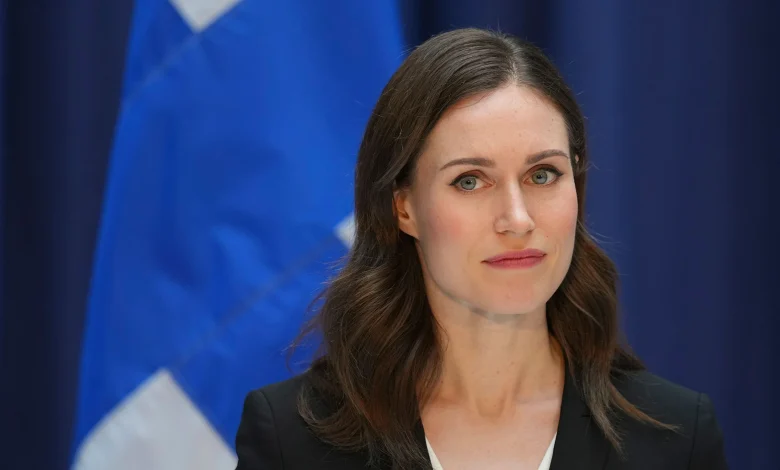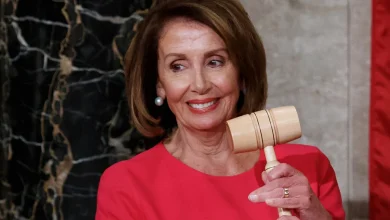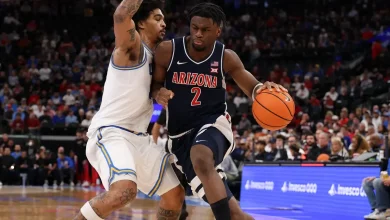Former Finnish prime minister discusses her memoir and tenure as world’s youngest leader

When Sanna Marin became Finland’s prime minister in 2019, she was the world’s youngest elected national leader at the time. For nearly four years, Marin led her country through the COVID-19 pandemic and into the NATO military alliance after Russia’s full-scale invasion of Ukraine.
Her new memoir is called “Hope in Action.” It explores how she navigated these challenging times and the consequences of being a millennial living, in her own words, “like someone my age.” She recalled that when she became prime minister, she didn’t feel fully ready.
She spoke to The World’s Host Carolyn Beeler about her book and her experiences.
Carolyn Beeler: You were the second most senior member of the Social Democrats not long before you became prime minister. Then in 2019, there were some unexpected changes in your party’s leadership that brought you to the fore as the country’s leader. How ready were you at the time to become Finland’s prime minister?Former Finnish Prime Minister Sanna Marin: It wasn’t an easy choice. I had to step in in a situation where we had a governmental crisis, and the previous prime minister had to resign. And, at that time, I had a just under two-year-old daughter at home. And of course, it took some consideration, should I seek that position or not, as the first vice chair of my party and a serving minister then.
But then, I got that positive feedback from my family and close ones. That said to me, “Of course, Sanna, you should run for that seat in office, you would do a good job.” But I didn’t actually feel ready. I was terrified of taking that position. And I asked those who were close to me at that night when I got elected, “Do I really have to do this now?”
So, I couldn’t say I was fully ready, but I felt confident. But I’ve also later learned that actually those moments when you don’t feel ready, and you don’t feel maybe most prepared, are the most important moments because those are also the moments when you can learn, and then you can also find out that maybe you can do the things that you were maybe a bit scared of.
Finnish Prime Minister Sanna Marin, Social Democratic Party chair, center, reacts as she watches results of exit polls in Helsinki, Finland, April 2, 2023.Sergei Grits/AP/File photo
Not long after you took office, the COVID-19 pandemic started. Finland had some of the lowest COVID rates in Europe during your time in office. You write that trust played a role in that. How so?
The deep trust that Finland has embedded within our society played actually an extremely important role. We have that Nordic welfare model in Finland that enables everybody to pursue their dreams, have equal opportunities when it comes to education … to work in society, in general. And that kind of society also builds trust, because when you meet those hard situations in your own life, you can trust and count the togetherness and that the society will carry you through those hard moments.
So, we have this deep trust within our society. And especially in the moments of crisis, it is extremely important that citizens and people can trust the institutions, us, politicians, the government, but also the medical authorities, other institutions. So, when we had to [put] extremely hard, restrictive measures [in] place — and many of those measures were actually volunteer-based because we didn’t have all the legislation in place when COVID started — people listened, they trusted that we had their best interests in mind and they participated [on a] voluntary basis. And that’s why we were also able to keep our infection rates so low and the death rates so low. So, I would say the deep trust that we have within our society played an extremely important role.
Russia invaded Ukraine while you were prime minister, too, adding to the busyness of your tenure. Finland shares an 800-mile border with Russia, and it was not part of NATO at the time. It joined under your leadership. Can you talk about what the substantive difference for Finland’s security is now, today, 2025, because it is a NATO member?
Well, of course, it was an extremely difficult situation when Russia started the full-scale invasion of Ukraine. And it also meant, for Finland, to have that discussion within our country, is the policy of being military non-aligned coming to an end and should we seek a membership in NATO? And it was a very volatile moment because Europe was in active war and there were a lot of fears and worries, also at that time. But it was at the same time very clear that we will seek membership.
Finland has always invested heavily in our own defense capabilities, because we have a very difficult history with Russia. We have been under Russian rule, and after becoming independent, we have had to fight wars with the Soviet Union. We have maintained our independence, but we have lost land and lives, and it has been an extremely difficult period in our history.
So, we know what kind of aggressive neighbor we have. And we have invested heavily in our own defense capabilities, unlike many European countries. And seeking membership in NATO was, of course, ensuring that we wouldn’t be alone in a situation if Russia would also pose that kind of threat towards Finland that it was posing to Ukraine. We have an aggressive neighbor and we have no illusions of what it is capable of.
Finland’s Prime Minister Sanna Marin (second row, right) stands with other world leaders at the European Political Community Summit in Bulboaca, Moldova, June 1, 2023.Andreea Alexandru/AP/File photo
And so, is Finland safer today because it is a member of NATO than it would have been otherwise, especially given the provocations that Russia is sending across the border into many European countries?
I would say that Finland is now more safe because we are part of the alliance. We already were a very close ally to NATO and we had deepened our cooperation and we were fully in line also with all the NATO capabilities before we applied for the membership. But, of course, we are now more safe together with the alliance. And I only hope that actually in the future we can also see Ukraine part of NATO because we have to understand that even though they are now in the midst of war, it is the only country in Europe that has that modern warfare experience. And they have the strongest army now in Europe. And we need the lessons learned from Ukraine. And we need Ukraine also as a security provider for all of Europe because they are strong and they are showing strength that is also unprecedented in our times.
Since leaving office in your post as prime minister, you’ve been working on efforts to support Ukraine. Why does Ukraine matter for the rest of Europe, especially right now when the US is maybe not seen as such a reliable partner?
Ukraine is part of Europe and Ukraine’s future is part of Europe. And Europe is very reliant also on the future of Ukraine. So, our futures and our destinies are linked. And I would say that one of the biggest mistakes that we as international community made was made in 2014, when Russia attacked Ukraine and annexed Crimea, and the international response was so weak. And Russia took full advantage of that weakness. And now we shouldn’t make the same mistake, to be seen as weak, because there are authoritarian countries and leaders watching the actions of a democratic world. And if we don’t show strength and determination, we will find it ahead of us.
Sanna, I want to turn to something else you write about in your book, which is also something that our listeners here in the US may remember, which was when you ended up in the news because of a video of you dancing with friends at a party. There was some criticism, and also some support, from high-profile women around the world. And you write in your book that it was important for you to be able to be yourself and not change to fit some stereotype of a prime minister. Why was that so important to you, even though it did draw criticism?
Well, of course, most of the time during my government was the handling of the big crises, the global pandemic, the war in Ukraine, our NATO process and just the everyday life of a coalition government, the endless negotiations and domestic politics and European politics that I had to handle as a prime minister. But there were also those moments that felt, personally to me, frustrating and also out of proportion. So, my book has a whole chapter about my scandals.
Right, a whole list of them.
Yeah, a whole list of them, not political by nature, so not scandals about misuse of power or money or corruption or anything serious to do with the work itself, but they are on the moralistic side. And of course, the most famous scandal is the dancing scandal where I had a free night during my summer holiday at a friend’s apartment and we sang and we danced and this was filmed and then the footage leaked to the press and there was this moral panic. How can I spend this kind of free time with my friends as a prime minister? Is that appropriate?
And for me, it was very important to tell quite frankly that this is me, the voters can decide whether they appreciate me and my actions or not. But I didn’t apologize for me dancing or singing because there was nothing wrong with that. And I don’t want to see women, in general, being marginalized, only to be a certain part of themselves. I think women are entitled to be fully themselves, 100% of themselves, whether they are in different professions or whether they’re prime ministers or leaders.
So, we can be strong, capable, [working] hard at our jobs, very tough at our jobs, and at the same time we can be mothers and sisters and good friends and we can have free time and we can be silly and also dance and sing and it doesn’t make us at all [not] credible in our jobs.
Finland’s Prime Minister Sanna Marin talks with Australian Prime Minister Anthony Albanese on the grounds of Government House in Sydney, Australia, Dec. 2, 2022.Mark Baker/AP/File photo
Whether it’s right or not, though, your personal life, like going out dancing, did bring this scrutiny and you wrote of your decision to exit politics, “I was tired of being torn down by the press for years.” So, I’m wondering, would you behave any differently if you went back and did it all again?
I wouldn’t behave differently, but I understand that the world is still very different for men and for women, and women face moral standards that actually nobody can reach. And that’s why it’s also so important to support women. The press scrutiny was only one part why I decided to leave politics.
Actually, the much bigger reason was more personal because, as I said, I had an under-two-year-old child at home when I started as a prime minister and I was working so much for the four years in office, that I’m really grateful that I was able to serve my country, but still, it meant missing out a lot on my daughter’s childhood. Now she’s seven, just started school, and I decided in 2023 that I don’t want to miss out on her entire childhood.
So, it was a personal decision also. Even though, I must say and admit, that the interest that the media had on my personal life felt intrusive many times.
You are only 40 years old. You have a long career ahead of you. How do you think about making that meaningful, especially when, whatever you do, you will internally weigh against the impact you were able to make as prime minister?
I have always thought that life is a mystery, so I never made five-year or ten-year plans for my career or for myself. I still feel extremely passionate about the issues, why I joined politics in the first place — human rights, gender equality, equality in general, that everybody have opportunities in their lives, that we build our societies in a way that your background isn’t the defining factor in your life, but you are able to educate yourself, and also tackling climate change, loss of biodiversity, the big crises that humanity is facing. So, I’m still very passionate about these issues, but I’m also able to work with these issues in different ways. I have never said never to going back to politics. Life will show me where my path will take me. But I also appreciate life as the mystery that it is. So, I’m taking one day at a time and trying to make a difference in those small ways that I can.
This interview has been lightly edited and condensed for clarity.




